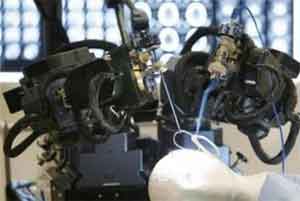- Home
- Editorial
- News
- Practice Guidelines
- Anesthesiology Guidelines
- Cancer Guidelines
- Cardiac Sciences Guidelines
- Critical Care Guidelines
- Dentistry Guidelines
- Dermatology Guidelines
- Diabetes and Endo Guidelines
- Diagnostics Guidelines
- ENT Guidelines
- Featured Practice Guidelines
- Gastroenterology Guidelines
- Geriatrics Guidelines
- Medicine Guidelines
- Nephrology Guidelines
- Neurosciences Guidelines
- Obs and Gynae Guidelines
- Ophthalmology Guidelines
- Orthopaedics Guidelines
- Paediatrics Guidelines
- Psychiatry Guidelines
- Pulmonology Guidelines
- Radiology Guidelines
- Surgery Guidelines
- Urology Guidelines
UK scientists create world's smallest surgical robot

Scientists in the UK have developed the worlds smallest surgical robot with low-cost technology used in mobile phones and space industries.
The robot, called Versius, mimics the human arm and can be used to carry out a wide range of procedures in which a series of small incisions are made to circumvent the need for traditional open surgery.
These include hernia repairs, colorectal operations, as well as prostate, ear, nose and throat surgery.
The robot is controlled by a surgeon at a console guided by a 3D screen in the operating theatre.
The robot is much easier to use than existing systems, and take up about a third of the space of current machines.
For robots to revolutionise surgery, they need to be versatile, easy to use and small so that surgical staff can move them around the operating room or between operating theatres, or pack them away when they are not being used.
"Our robot does all of this and is the first robotic arm to be designed specifically for laparoscopic surgery," said Martin Frost, chief executive of the Cambridge Medical Robotics.
One of the key benefits of the robot is that it works like a human arm and contains technology that detects resistance to make sure the right amount of force is used when the instruments are inside the patient, The Guardian reported.
Researchers used electronics from mobile phones to help the robot "think" and process information, and gear box technology originally designed for the space industry to help it move.
The robot is set to be launched next year.

Disclaimer: This site is primarily intended for healthcare professionals. Any content/information on this website does not replace the advice of medical and/or health professionals and should not be construed as medical/diagnostic advice/endorsement or prescription. Use of this site is subject to our terms of use, privacy policy, advertisement policy. © 2020 Minerva Medical Treatment Pvt Ltd